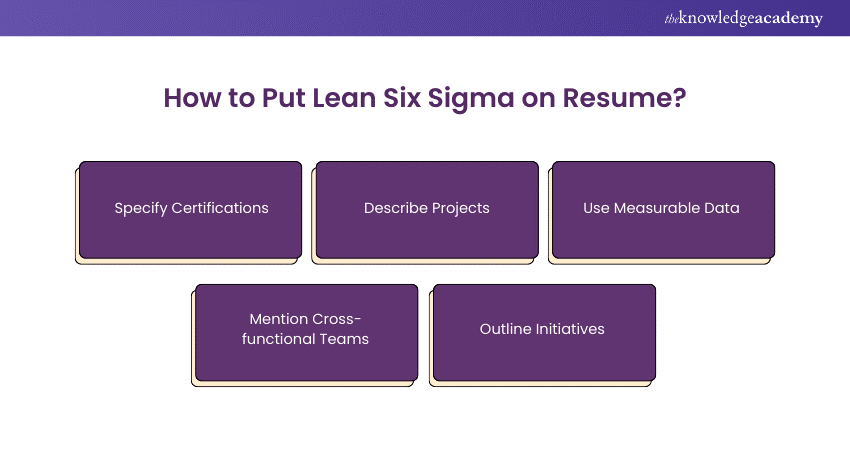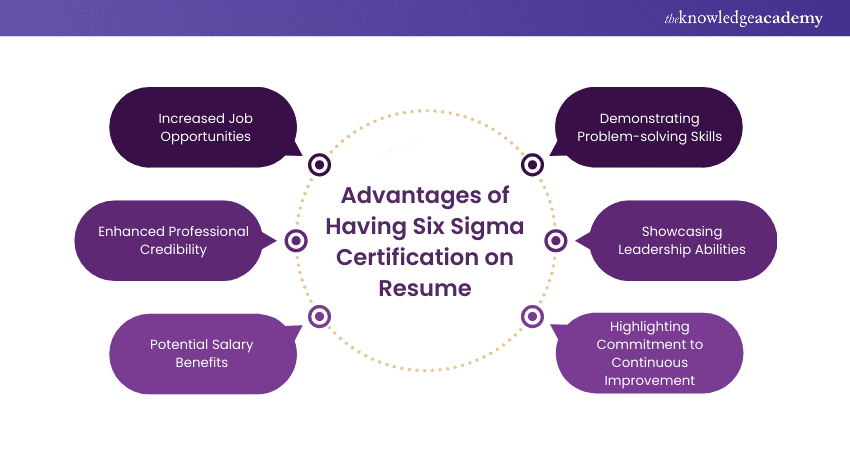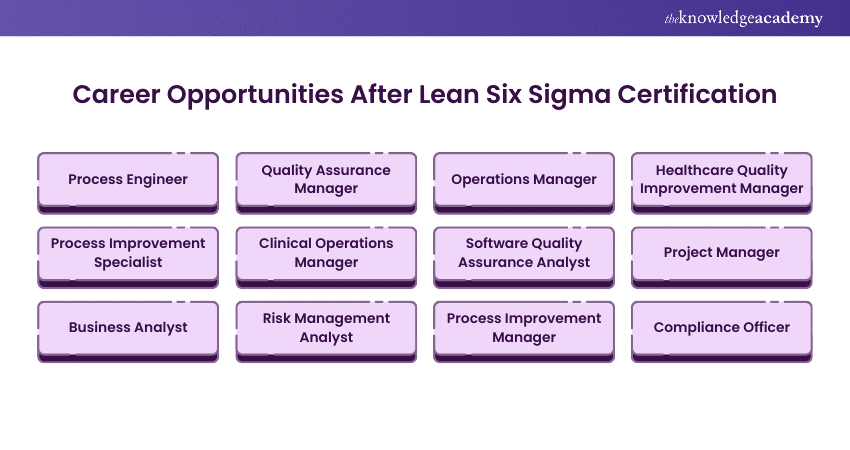We may not have the course you’re looking for. If you enquire or give us a call on 01344203999 and speak to our training experts, we may still be able to help with your training requirements.
Training Outcomes Within Your Budget!
We ensure quality, budget-alignment, and timely delivery by our expert instructors.

Are you wondering How to Put Lean Six Sigma on Resume to make it shine? In today’s competitive job market, having a Lean Six Sigma certification can be the game-changer that sets you apart from other candidates. But simply listing it isn't enough; you need to strategically incorporate it into your resume to truly showcase your expertise and the value you bring to potential employers.
So, where should you begin? Integrate Lean Six Sigma into your resume through your experience, achievements, or specific projects to highlight your expertise. By doing so, you demonstrate your qualifications and vividly depict your professional journey and the significant impact you’ve made. If you're curious about How to Put Lean Six Sigma on Resume, let’s dive in!
Table of Contents
1) How to Put Lean Six Sigma on Resume?
2) Advantages of Having Six Sigma Certification on Resume
3) What Career Opportunities Are Available with Lean Six Sigma?
4) Conclusion
How to Put Lean Six Sigma on Resume?
Effectively showcasing Lean Six Sigma on your resume can significantly enhance your job prospects. Here's how to put Lean Six Sigma on your resume:

1) Specify your certifications like Green Belt or Black Belt to showcase formal training and expertise.
2) Detail projects where you applied Lean Six Sigma methods to enhance processes, reduce waste, or improve quality.
3) Use measurable data to describe the impact of your Lean Six Sigma initiatives, such as percentage reductions in defects or time savings.
4) Mention cross-functional teams you led or worked with, underscoring your project management and teamwork capabilities.
5) Outline any initiatives/workshops you have initiated to promote efficiency and continuous improvement within your organisation.
Example 1: Highlighting Lean Six Sigma in the Experience Section
Herre’s the first example showcasing Lean Six Sigma in the experience section:
|
EXPERIENCE -------------------------------------------------------------------------------- Process Improvement Manager [Company name] 04/2023- Present Manchester, UK a) Directed a diverse team in the strategic redesign of manufacturing protocols, achieving a notable 23% reduction in waste over 12 months. b) Orchestrated the rollout of a comprehensive Lean training curriculum for a cohort of 120 employees, resulting in a significant 15% uplift in productivity metrics. c) Led a pivotal project that successfully condensed the supply chain cycle from 14 to 9 days, enhancing operational efficiency and amplifying customer satisfaction levels. -------------------------------------------------------------------------------- Quality Assurance Analyst [Company name] 01/2021 - 03/2023 Manchester, UK a) Executed the Six Sigma DMAIC methodology to tackle quality assurance challenges, boosting product uniformity by an impressive 30%. b) Guided a series of continuous improvement efforts that dramatically lowered defect rates from 5% to a mere 1.2% over the course of a year. c) Conducted a thorough examination of process workflows and Pareto charts, identifying critical bottlenecks and implementing solutions that resulted in an 18% increase in process throughput. -------------------------------------------------------------------------------- Operations Analyst [Company name] 06/2014 - 12/2017 Manchester, UK a) Undertook comprehensive data scrutiny of shop floor activities, culminating in a substantial 20% decrease in equipment idle time. b) Partnered with the engineering division to refine production configurations, yielding improved process efficiency and an annual cost saving of £50,000. c) Identified and rectified 80% of superfluous tasks within the packaging process, resulting in a marked elevation of performance indicators. |
1) Utilise specific numbers and outcomes to demonstrate the direct impact of your achievements, which is crucial for attracting the attention of employers. )
2) Maintain a varied language style to keep your resume dynamic and compelling, showcasing strong communication skills and versatility.
3) Include detailed descriptions of specific projects and their business objectives to clearly link your contributions to company success.
4) Highlight a diverse range of work scenarios to underscore your adaptability and the depth of your professional experience.
5) Highlight ongoing employment to indicate the currency of your skills and active involvement in continuous process improvement.
Example 2: Featuring Lean Six Sigma in the Achievements Section
Herre’s the second example showcasing Lean Six Sigma in the achievements section:
With more than a decade of experience, I have refined my skills in optimising processes and achieving efficiency gains, enhancing product quality and customer satisfaction. I apply Lean Six Sigma principles rigorously, leading teams to substantial enhancements in performance and cost savings. A standout achievement in my career includes directing a project that resulted in a 30% reduction in process waste.
1) The summary is straightforward and promptly outlines the applicant's extensive experience, which is crucial for hiring managers.
2) It avoids generic language by highlighting a significant career achievement that demonstrates the successful application of Lean Six Sigma methodologies.
3) The applicant conveys a strong enthusiasm for improving processes, a trait that appeals to prospective employers.
4) Mentioning Lean Six Sigma implies technical proficiency, showcasing a systematic and data-driven approach to solving problems.
Advantages of Having Six Sigma Certification on Resume
Incorporating Six Sigma certification into your resume transcends basic credentials, offering a suite of benefits that are highly regarded by employers in a competitive job landscape. Here’s an overview of its key advantages:

1) Increased Job Opportunities:
a) Valued across various industries like manufacturing, healthcare, IT, and finance.
b) Makes you eligible for roles requiring process improvement skills.
c) Recognised globally, broadening your job prospects.
2) Enhanced Professional Credibility:
a) Demonstrates expertise in quality management and process improvement.
b) Shows you have undergone rigorous training.
c) Makes you a more attractive candidate to employers.
3) Potential Salary Benefits:
a) Certified professionals often earn higher salaries.
b) Your skills can lead to significant cost savings and revenue increases for companies.
c) Employers are willing to pay more for your ability to deliver tangible benefits.
4) Demonstrating Problem-solving Skills:
a) Six Sigma focuses on solving problems and improving processes.
b) Shows you can tackle complex issues effectively.
c) Highly valued skill in any industry.
5) Showcasing Leadership Abilities:
a) Many projects require leading a team to achieve improvements.
b) Indicates experience in leadership roles and managing cross-functional teams.
c) Highlights your ability to drive change and achieve project outcomes.
6) Highlighting Commitment to Continuous Improvement:
a) Shows dedication to enhancing your skills and processes.
b) Indicates you are proactive in seeking ways to make positive changes.
c) Demonstrates willingness to invest in your professional growth.
Gain foundational skills with the Lean Six Sigma Yellow Belt Course - start your certification now!
What Career Opportunities Are Available with Lean Six Sigma?
A Lean Six Sigma certification can open doors to various career opportunities across multiple industries. Here are specific job roles:

a) Process Engineer: Focuses on analysing and improving manufacturing processes to enhance efficiency and reduce waste.
b) Quality Assurance Manager: Ensures products meet quality standards by implementing Six Sigma methodologies.
c) Operations Manager: Oversees the production process, applying Lean Six Sigma principles to streamline operations and improve productivity.
d) Healthcare Quality Improvement Manager: Uses Six Sigma tools to enhance patient care and reduce medical errors.
e) Process Improvement Specialist: Works on optimising healthcare processes to improve operational efficiency and patient outcomes.
f) Clinical Operations Manager: Applies Lean Six Sigma to streamline clinical processes, ensuring effective resource utilisation and better patient care.
g) Software Quality Assurance Analyst: Utilises Six Sigma methods to improve software quality and reduce bugs.
h) Project Manager: Manages IT projects using Six Sigma principles to ensure they are completed on time and within budget.
i) Business Analyst: Applies Six Sigma techniques to analyse and improve IT processes, enhancing overall system efficiency.
j) Risk Management Analyst: Uses Six Sigma methodologies to identify and mitigate operational risks.
k) Process Improvement Manager: Optimises financial processes to enhance customer service and reduce operational costs.
l) Compliance Officer: Implements Six Sigma techniques to ensure financial operations comply with regulatory standards and reduce compliance risks.
Achieve excellence with Lean Six Sigma Green Belt Training - sign up today and get started!
Conclusion
Incorporating Lean Six Sigma into your resume is your secret weapon for standing out in the competitive job market. Highlight certifications, impactful projects, and measurable achievements to showcase your value. These strategies on How to Put Lean Six Sigma on Resume boost credibility, job opportunities, and potential salary benefits. Elevate your career today!
Unlock your potential with Lean Six Sigma Certification Training - start your journey today!
Frequently Asked Questions

Yes, Lean Six Sigma is considered a technical skill. It involves using statistical tools and methodologies to improve processes, reduce waste, and enhance quality. This requires specialised knowledge and training in these techniques.

Yes, Lean Six Sigma is a qualification. It certifies individuals in process improvement techniques and methodologies. This demonstrates their ability to enhance efficiency, reduce waste, and improve quality within organisations.

The Knowledge Academy takes global learning to new heights, offering over 30,000 online courses across 490+ locations in 220 countries. This expansive reach ensures accessibility and convenience for learners worldwide.
Alongside our diverse Online Course Catalogue, encompassing 17 major categories, we go the extra mile by providing a plethora of free educational Online Resources like News updates, Blogs, videos, webinars, and interview questions. Tailoring learning experiences further, professionals can maximise value with customisable Course Bundles of TKA.

The Knowledge Academy’s Knowledge Pass, a prepaid voucher, adds another layer of flexibility, allowing course bookings over a 12-month period. Join us on a journey where education knows no bounds.

The Knowledge Academy offers various Lean Six Sigma Certification Training, including Lean Six Sigma Green Belt, Lean Six Sigma Yellow Belt, Lean Six Sigma Black Belt and Lean Six Sigma Black Belt Upgrade. These courses cater to different skill levels, providing comprehensive insights into Lean Six Sigma Roles and Responsibilities.
Our Business Improvement Blogs cover a range of topics related to Lean Six Sigma, offering valuable resources, best practices, and industry insights. Whether you are a beginner or looking to advance your Business Improvement skills, The Knowledge Academy's diverse courses and informative blogs have got you covered.
Upcoming Business Improvement Resources Batches & Dates
Date
 Lean Six Sigma Green Belt
Lean Six Sigma Green Belt
Mon 6th Jan 2025
Mon 13th Jan 2025
Mon 20th Jan 2025
Mon 27th Jan 2025
Mon 3rd Feb 2025
Mon 10th Feb 2025
Mon 17th Feb 2025
Mon 24th Feb 2025
Mon 3rd Mar 2025
Mon 10th Mar 2025
Mon 17th Mar 2025
Mon 24th Mar 2025
Mon 31st Mar 2025
Mon 7th Apr 2025
Mon 14th Apr 2025
Tue 22nd Apr 2025
Mon 28th Apr 2025
Tue 6th May 2025
Mon 12th May 2025
Mon 19th May 2025
Tue 27th May 2025
Mon 2nd Jun 2025
Mon 9th Jun 2025
Mon 16th Jun 2025
Mon 23rd Jun 2025
Mon 30th Jun 2025
Mon 7th Jul 2025
Mon 14th Jul 2025
Mon 21st Jul 2025
Mon 28th Jul 2025
Mon 4th Aug 2025
Mon 11th Aug 2025
Mon 18th Aug 2025
Tue 26th Aug 2025
Mon 1st Sep 2025
Mon 8th Sep 2025
Mon 15th Sep 2025
Mon 22nd Sep 2025
Mon 29th Sep 2025
Mon 6th Oct 2025
Mon 13th Oct 2025
Mon 20th Oct 2025
Mon 27th Oct 2025
Mon 3rd Nov 2025
Mon 10th Nov 2025
Mon 17th Nov 2025
Mon 24th Nov 2025
Mon 1st Dec 2025
Mon 8th Dec 2025
Mon 15th Dec 2025







 Top Rated Course
Top Rated Course



 If you wish to make any changes to your course, please
If you wish to make any changes to your course, please


